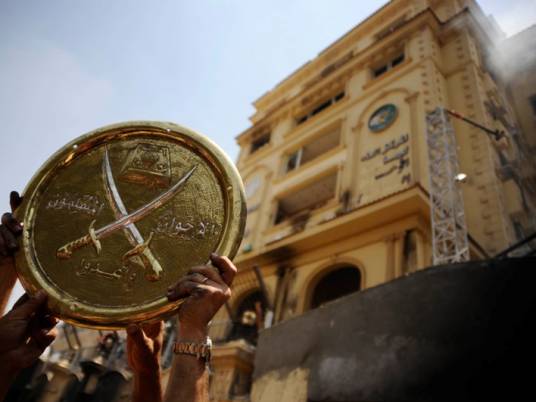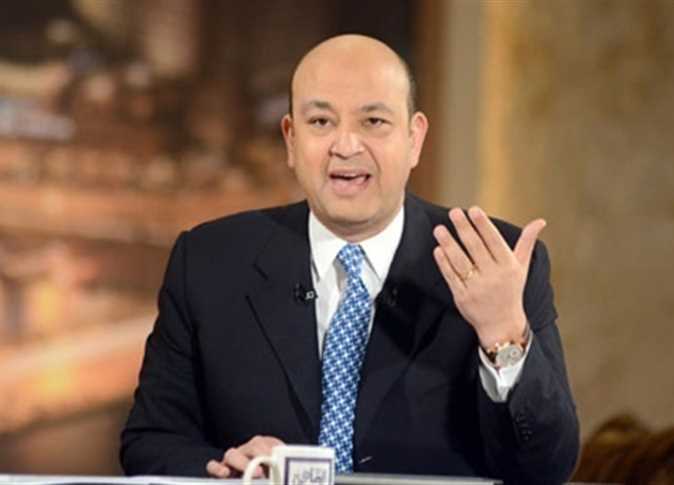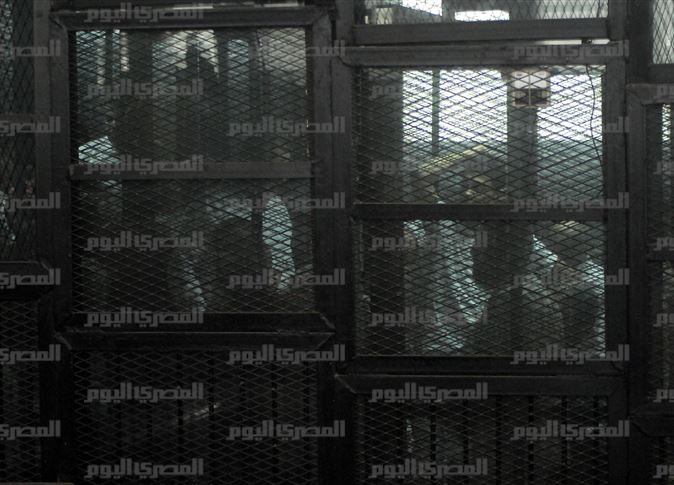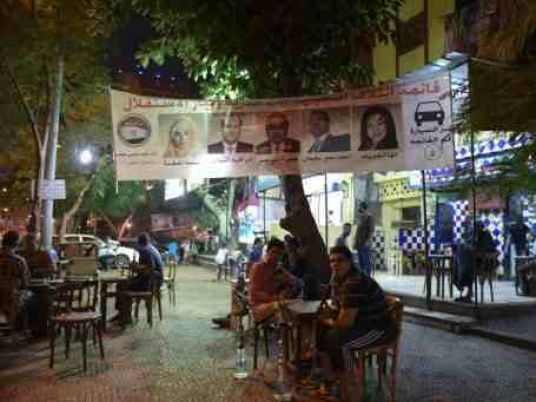
Ezzat Khamis, chairman of the Brotherhood Funds Inventory Committee, said in an interview with Al-Masry Al-Youm that the properties of 1,252 members the Muslim Brotherhood’s Guidance Bureau, Shura Council, international organization and the Freedom and Justice Party have been seized so far, including properties belonging to Mohamed Morsi, Khairat al-Shater, Yusuf al-Qaradawi, Mahmoud Ezzat, Ahmed Mansour and Mohamed Abu Treika.
Khamis argued that the Brotherhood was attempting to form a state within the state with the many companies, schools and associations they owned. He said the committee is seizing and not confiscating the properties. “Confiscation needs a court order,” he explained.
Q: What are the latest figures of the committee?
A: We have seized properties of 1,252 Brotherhood members.
Q: Were they all members or individuals that were dealing with them?
A: All of them were actual members. We have no jurisdiction over supporters or sympathizers with the Brotherhood.
We have seized mobile assets, liquid funds, real estate and even cars. They can no longer dispose of them or transfer their ownership.
Q: What about their schools?
A: We have seized 103 schools of various stages of education. They are now being supervised by the Education Ministry, which is revising the curricula that were indoctrinating the students with hostile ideas.
Q: We heard that only one observer is supervising those schools. How can he carry out such a task alone?
A: That is not true. There is a board of professionals and there are monitoring committees doing this job.
Q: And how about their associations?
A: We have seized 1,111 associations, some of which were charities, others made profits.
Q: Does this mean the Muslim Brotherhood was forming a state within the state?
A: By all means.
Q: Do they have the right to form new associations?
A: No, because they had violated the terms when they formed them.
Q: Which members are we talking about?
A: Members the Muslim Brotherhood’s Guidance Bureau, Shura Council, international organization and the Freedom and Justice Party, including Mohamed Morsi, Khairat al-Shater, Yusuf al-Qaradawi, Mahmoud Ezzat, Ahmed Mansour and Mohamed Abu Treika.
Q: Does the committee rely on security reports?
A: Among other sources.
Q: Once you receive reports about a certain Brotherhood member committing an act of terrorism, how long do you take to seize his funds?
A: Within 15 days. And the defendant has the right to challenge the decision more than once, but we will put limits to the number of challenges because it is a waste of time.
Q: You were given one more year to accomplish the mission. Is this enough?
A: We cannot be restricted with deadlines because we depend on court rulings that may take time.
Q: Has the committee seized funds belonging Mohamed Morsi?
A: Yes, we have seized his money in the banks, but he does not own companies.
Q: What happens to the profits their companies still make?
A: The public sector companies that are managing the Brotherhood’s businesses pay the due taxes, the social security and the dividends of the employees from the profits. The rest is deposited in a bank account that the original owners cannot withdraw from except with the prior consent of the committee, but none of them submitted such a request to us.
Q: Some claim the confiscation of the funds is illegal because it was ordered by an incompetent court. Is that true?
A: We are not confiscating the funds. We are seizing them. And we will return them with the profits if any of the defendants is acquitted of the terrorism charge.
Q: So what is the purpose of the seizure?
A: To make sure the funds are not financing terrorist activities.
Q: What about the funds of the Brotherhood members who fled to Turkey and Qatar?
A: We have seized their funds too.
Q: How many are they?
A: Too many. I cannot remember.
Q: Have the countries they fled to been helpful?
A: No, as expected.
Q: Is TV presenter Ahmed Mansour among them?
A: Yes. We paid LE100,000 from his seized funds to compensate the lawyer he was found guilty of torturing in Tahrir Square during the January 25 revolution.
Q: Does this mean victims of the Brotherhood terrorism can apply for compensation?
A: Yes, if they have a final court ruling.
Q: Have you seized the funds of Mahmoud al-Khodairy?
A: Yes, and part of the lawyer’s compensation was paid from his seized funds.
Q: Did the committee pay compensation to the victims of the events of Ittihadiya, Rabaa Square and Nahda Square?
A: Nobody applied for compensation.
Q: How much has the committee seized so far?
A: LE600 million, which is a small figure compared to the large financial capabilities that this organization has, which made of it a state within the state. They deposit only a small part of their money in the banks. The bulk is constantly reinvested.
Q: Did they syphon money abroad after the June 30 revolution?
A: Possibly.
Q: Who is financially stronger, Khairat al-Shater or Hassan Malik?
A: Hassan Malek, of course.
Q: Where do they invest their money?
A: In the consumer market that yields quick profits, not in heavy industry projects from which the state can benefit more, and which create more job opportunities.
Q: What about their employees?
A: They are all members of the group.
Q: Have any of their companies evaded taxes?
A: Yes, and we paid those taxes from their seized funds.
Q: What are the footballer Mohamed Abu Treika?
A: Why all the buzz about Abu Treika? The guy is a Brotherhood member. He has a travel agency in Alexandria that is run by Brotherhood members, of which one is serving a prison sentence for involvement in terrorist acts.
His funds were seized in his capacity as chairman of the board, and the management of the agency was assigned to Misr Travel, just like all the other travel agencies owned by Brotherhood elements.
His two appeals were rejected because they contained implausible alibis.
He still has to sign checks next to the committee’s signature, but he switched off his phone and never showed up in meetings.
We reported his managing director to the prosecutor general for failing to submit the documents of the travel agency to the committee.
Q: Why were his appeals rejected?
A: Because he denied that he is a member of the Brotherhood. Why then did he not fire the manager who was convicted of terrorism? If he knew that he was a terrorist and did not do anything about it, it makes of him an accomplice. And if he did not know, he is still responsible because he is the chairman.
Q: Was it proven that the agency supported the crimes committed by the Brotherhood?
A: As I said, the manager was found guilty.
Q: Why did you seize all his funds and not just the travel agency?
A: The seizure applies to all properties, liquid funds and movables of a certain individual.
Q: Did Abu Treika apply for social aid after his funds were seized?
A: No.
Q: Does the committee coordinate with the Illicit Gain Authority?
A: Of course.
Q: What about other challenges submitted by Brotherhood elements?
A: We have accepted many of them, which proves that we are impartial and that we do not take instructions from anyone.
Q: To whom are the challenges submitted?
A: To the normal courts. But we noticed that they submit them to the administrative court, claiming that we are not a judicial entity, which is wrong. We carry out judicial rulings, which makes us an executive judicial entity.
Unfortunately, the administrative court issued several verdicts annulling seizures on the basis that we are an administrative and not judicial entity.
Q: What did you do about it?
A: We have appealed them.
Q: Were there partnerships between the Brotherhood businessmen and those of the dissolved National Democratic Party?
A: Their businesses are like a spider’s web that is difficult to track down. For example, we found that some hospitals that made profit belong to charities that are not allowed to make profit. But normally they do not enter into partnerships with businessmen outside their organization.
Q: Does the committee maintain those profits?
A: Of course. There is this company that made 48 million pounds in profits, which we have raised to 62 million pounds under our management.
Q: Has the committee succeeded in preventing funds from financing acts of terrorism?
A: Certainly.
Q: But the terrorist acts did not stop. Why?
A: We cannot do it alone. This is the responsibility of all Egyptians and of the state.
Q: Do you face obstacles from the government?
A: Everybody is helping us. We have a representative in each ministry.
Q: What have you learnt from all this?
A: That I had a wrong idea about the Brotherhood. I thought they were a religious group that preached virtue. But then I found out that they do not consider Egypt their homeland. They only work for their own interests.
Edited translation from Al-Masry Al-Youm



